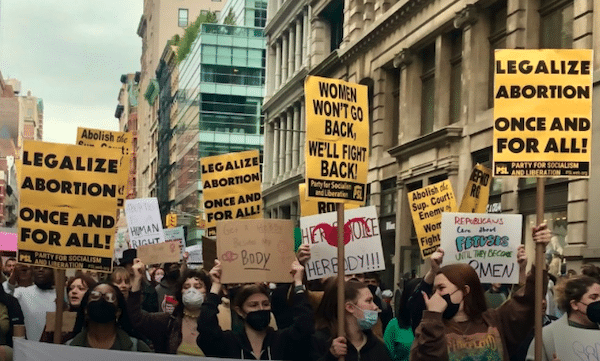On Nov. 5, voters in 10 states were presented with ballot initiatives on abortion with seven states passing pro-abortion rights measures, including in states with currently restrictive abortion laws as well as in states carried by Donald Trump.
The movement to use the popular initiative process to enshrine abortion rights at the state level has taken off since 2022 when the Supreme Court’s Dobbs v. Jackson decision overturned Roe v. Wade which had legalized abortion in the U.S. for nearly 50 years.
Before Dobbs, access to comprehensive reproductive care was far from universal. However, the evisceration of Roe illustrated the truth of the slogan,
Right to life, your name’s a lie! You don’t care if women die!
In the wake of Dobbs, maternal and infant deaths have soared, as predicted by reproductive rights advocates. In addition, care for those experiencing miscarriage and stillbirth has been greatly impacted by abortion restrictions. Numerous women experiencing miscarriage have died or experienced permanent damage to their health because medical staff refused to provide routine miscarriage care due to abortion restrictions. Recently, pregnant Texas teenager Nevaeh Crain died while seeking miscarriage care when routine treatment adminstered in a timely fashion would have saved her life. Doctors insisted on two ultrasounds to confirm “fetal demise” before giving her what would have been a lifesaving procedure.
Breakdown of results at the polls
This November, 10 states had abortion-related measures on the ballot.
Arizon a: The Right to Abortion initiative passed with more than 60% of the vote, providing a legal avenue to challenge the current 15 week ban. The measure establishes a right to abortion and would prevent the state from restricting abortion up to viability. Arizona’s policies are considered very restrictive. In April the state Supreme Court upheld an 1864 total ban on abortion. This ban was eventually repealed and never took effect.
Colorado: Coloradans enshrined the right to abortion in the state constitution with 61% of the votes cast.
Florida: An abortion rights measure failed to pass with 57 % voting in favor. Yes, you read that correctly. A majority of those voting supported the measure but Florida’s undemocratic initiative system requires a supermajority of 60% to pass. Florida has enacted a very strict, six-week abortion ban.
Maryland: Abortion rights supporters in Maryland overwhelmingly voted to enshrine the right to abortion in the state constitution with 74%.
Missouri: In the state that enacted the first abortion ban after Roe was overturned in 2022, voters overturned that ban with 52% voting in favor.
Montana: With 57% of the votes cast, Montanans ensured that abortion would continue to be accessible.
Nebraska: Nebraska had two abortion-related measures on the ballot, one in support of abortion rights and one restricting abortion rights. The restrictive measure passed with 55%, banning abortion after the first trimester. Proponents of the anti-abortion initiative had originally tried and failed to place a measure on the ballot that would have banned abortion from the time of conception. The pro-choice measure that was defeated would have permitted abortion until fetal viability (about 24 weeks); it garnered 49% of the votes.
Nevada: Voters approved the abortion rights measure with 63% of the votes. State law requires ballot amendments to be voted on twice, so it will appear on the ballot again in 2026. Abortion access in the state has not changed much since Dobbs.
New York: Voters passed a broad reproductive rights initiative that prohibited discrimination based on “pregnancy outcomes” with 62% of the votes.
South Dakota: An abortion rights measure failed to pass with only 40% voting in favor. The measure was not supported by major abortion rights organizations; it was seen as not going far enough to support abortion rights. South Dakota has one of the strictest abortion bans in the nation.
Democrats tried to exploit abortion yet again
The Democrats and the Harris campaign placed a great deal of their hope for victory in the popularity of abortion rights. What this election proves is that abortion rights are popular but the Democrats are not. Trump made some effort to distance himself from the most extreme reproductive rights restrictions such as fetal rights laws that impacted in vitro fertilization treatment, as well as supporting making abortion a state decision. Voters came out to support abortion rights, but this didn’t lead to increased votes for Harris.
Pro-choice voters are sick of seeing women and others suffer and die needlessly because they cannot access a simple procedure that had been legally available for 50 years. The Democrats could have prevented the Dobbs disaster by passing a federal law enshrining abortion rights. They failed to do so even when it would have been easy. Instead, they used the fear of overturning Roe to garner donations and votes for decades while actually doing nothing. No wonder abortion rights voters lacked motivation to vote Democrat.
Abortion access is essential for the free and equal participation of women in society, but it’s not the only thing we need. We need to truly have the power to choose if, when and how many children we want to have and to be able to raise those children in decent homes, with quality healthcare and schools. Our children should not have to face a future of being exploited by billionaire capitalists or being placed on the school to prison pipeline. We need a truly democratic society where the needs of the majority of people, the working class, come first. We need socialism to truly realize our liberation.

